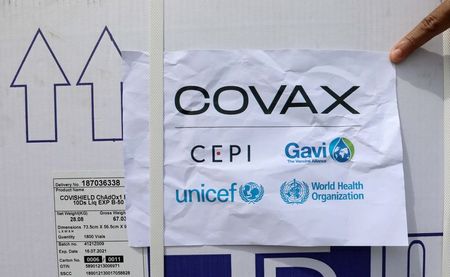MPs urge government to donate half of incoming vaccines to Covax scheme

MPs and peers have urged the UK to adopt a Covid-19 “vaccine matching” scheme in a letter today, which would see half of the doses the arrive in the UK be donated to the Covax scheme.
The letter, coordinated by the All-Party Parliamentary Group (APPG), said that prime minister Boris Johnson has a “moral duty” to share some of the UK’s vaccines with developing nations to avoid a “humanitarian disaster”.
The global Covax scheme attempts to curb vaccine inequality by getting wealthier nations to donate jabs.
Sharing vaccines would show “global leadership”, the letter said, which is crucial for post-Brexit Britain ahead of the UK hosted G7 summit and COP26.
“As the eyes of the world are upon us for the G7 summit, it’s time to show global leadership and donate an equal share of vaccine doses to those who need them most,” APPG chair and Liberal Democrat, Layla Moran, said.
“This would not only save lives abroad but would reduce the risk of new variants emerging that would threaten our own hard-won progress against the pandemic here at home.”
The UK was one of the earliest vaccination donors, according to ministers, and has ordered over 400m doses of various vaccines, with the promise of giving most of its surplus supply to poorer countries.
The World Health Organisation, the International Money Fund (IMF) and the World Bank have voiced concern that not enough is being done to stop new variants spreading – and say no one is safe until everyone is vaccinated.
“To save lives at home, we must vaccinate the world,” the letter said, as it suggested “vaccine matching,” where each dose of the vaccine imported into the UK, one dose is donated to lower and middle-income nations via the Covax scheme.
The letter also said that the UK should bolster its own manufacturing capacity, to become a “net vaccine exporter”.
The APPG were also in support of the US-suggested vaccine patent waiver.
It comes on the same day that European Union countries were told they should take account of global shortages of Covid-19 vaccines before rolling out shots for adolescents, by the European Centre for Disease prevention and Control (ECDC).
Last week, the EU drugs regulator authorised Pfizer and partner BioNTech’s Covid-19 vaccine for children as young as 12. Its previous guidance was for adults aged 16 and above.
The ECDC – echoing World Health Organization (WHO) calls to delay inoculations of young adults in rich nations – said in a report that vaccinating adolescents should be a priority only when they are at high risk of developing serious coronavirus symptoms.